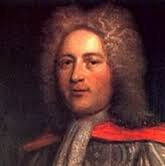Jeremiah Clarke
Jeremiah Clarke (c. 1674 – 1 December 1707) was an English baroque composer and organist, best known for his Trumpet Voluntary.
Thought to have been born in London around 1674, Clarke was one of the pupils of John Blow at St Paul's Cathedral and a chorister in 1685 at the Chapel Royal. Between 1692 and 1695 he was an organist at Winchester College, then between 1699 and 1704 he was an organist at St Paul's Cathedral. He later became an organist and 'Gentleman extraordinary' at the Chapel Royal, he shared that post with William Croft, his friend. They were succeeded by John Blow.
Clarke is best remembered for a popular keyboard piece: the Prince of Denmark's March, which is commonly called the Trumpet Voluntary, written in about 1700. From c. 1878 until the 1940s the work was attributed to Henry Purcell, and was published as Trumpet Voluntary by Henry Purcell in William Spark's Short Pieces for the Organ, Book VII, No. 1 (London, Ashdown and Parry). This version came to the attention of Henry Wood, who made two orchestral transcriptions of it, both of which were recorded. The recordings further cemented the erroneous notion that the original piece was by Purcell. Clarke's piece is a popular choice for wedding music, and has been used in royal weddings.
The famous Trumpet Tune in D (also incorrectly attributed to Purcell) was taken from the semi-opera The Island Princess, which was a joint musical production of Clarke and Daniel Purcell (Henry Purcell's younger brother)—probably leading to the confusion
"A violent and hopeless passion for a very beautiful lady of a rank superior to his own" caused Clarke to commit suicide. Apparently, he fell madly in love with a beautiful woman. But the woman was out of his league in every way, and he couldn't bear it. It is not known if the woman knew of his love and spurned him, or the love was reciprocated but the difference in their stations would not permit their union, or perhaps, if he was too shy to ever face her. Because of this, he made a decision to take his own life.
Clarke had been visiting a friend who lived in the countryside. He abruptly determined to leave the countryside and return to London. His friend observed his dejection, and disappointment in love, and furnished him with a horse and a servant to take care of him. Clarke, who was still melancholy, rode his horse and alighted. He went into a field, and stood on the bank of a pond. He started wondering about his suicide method. He thought about drowning himself or hanging himself on the trees on its margin. So, to decide his fate, he tossed a coin in the pond. However, the coin landed in the mud on its side. Since this suicide attempt was a failure, he mounted his horse, and returned to London. Instead of consoling himself, he therefore chose a third method of suicide. He pulled out a pistol and shot himself in the head in the churchyard of St Paul's Cathedral.
Suicides were not generally granted burial in consecrated ground, but an exception was made for Clarke, who was buried in the crypt of St Paul's Cathedral (though other sources state he was buried in the unconsecrated section of the cathedral churchyard.)














 My Wish List
My Wish List










